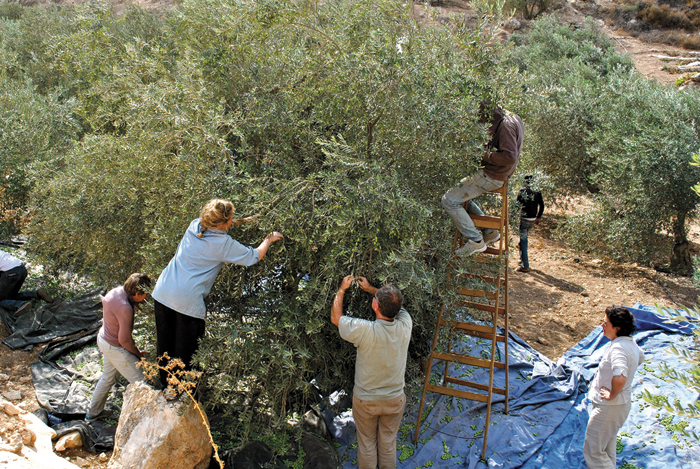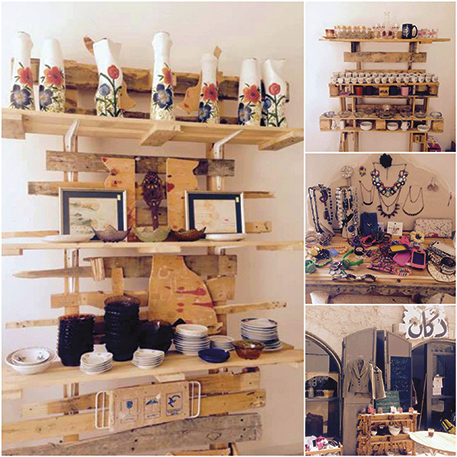By: Aisha Mansour

International activists support olive harvest in Surif. Photo courtesy of Palestine Solidarity Project.
It was the summer of 2006. It had been eight years since my previous visit to Palestine and to be honest, I had not spent much time thinking about the homeland. The previous visit had not really been a vacation; I had visited only briefly to attend the wedding celebration of my younger sister who was getting married to our cousin. Back in the US, I had focused on completing my master’s degree and had entered into a prestigious US government fellowship program, aiming to build my career. But in 2006, as I was reading the newsletter of a local peace and justice group, there it was: A travel report written by a volunteer who had taken part in an olive picking program in Palestine. Palestine. It has been too long. Something struck me and I knew I simply had to go to Palestine to pick olives – and that is what I did. The experiences of this trip and the shock at how much my homeland had changed – apparently, the occupation keeps evolving and the situation is getting worse(!) – prompted me to re-engage with and eventually move to Palestine.
While there are several bodies and structures that focus on tapping into the Palestinian diaspora, for a regular Palestinian living abroad it is not easy to figure out how to connect with the homeland. The Palestine Liberation Organization has an entire department focused on the Palestinian diaspora; I learned about it at a diaspora conference in Ramallah last July. The Palestinian Authority’s Ministry of Foreign Affairs (MFA) focuses on connecting to the Palestinian diaspora as well; it connects to tour groups from the diaspora and provides them with key experiences such as walking along the Wall and experiencing Qalandia checkpoint, among other encounters. The UNDP’s TOKTEN program supports and helps connect Palestinians who live abroad and wish to return to serve in a Palestinian institution. (For nine months, I was a TOKTEN volunteer, working within the ministry of health and using my background in hospital management and health policy.) Furthermore, diaspora conferences are held multiple times a year to cajole successful Palestinian business-minded people in the diaspora to invest in and into their homeland.
While there are several programs and interventions aimed at engaging the Palestinian diaspora, sadly, there is no one-stop shop to help diaspora Palestinians connect to their homeland and apply their unique capacities by taking into account both, their special circumstances and the needs and priorities of various communities in Palestine. Every Palestinian is an asset. The challenge is how to make best use of every individual’s qualities so that they can contribute to a local community, be it in Palestine through direct action or abroad through the raising of awareness.

The opening ceremony of the Dukkan that offers donated items for sale in a socially conscious form of recycling.
It could be that the framework for engaging the Palestinian diaspora with Palestine should be re-examined. Instead of focusing on a specific niche, such as business investment in Palestine by persons of the diaspora, we should apply a more comprehensive approach that from the start includes the entire Palestinian community, those living in Palestine and those living abroad. The new paradigm should consider the multiple motivations that drive Palestinians to serve, contribute to, and engage with their country. During a workshop last March at the Dalia Association in Ramallah, Professor Emily Regis provided a brief summary and history of engagement of the Palestinian diaspora. She explained that first-generation diaspora Palestinians tend to contribute to the mother country by means of charitable giving and by supporting traditional infrastructure, such as building schools and healthcare centers, while the second generation prefers to be directly involved in community development and social justice actions. Understanding such motivating factors is crucial when involving the Palestinian diaspora in their contributing and giving to Palestine.
Rather than focus on a specific sector, I suggest that the Palestinian diaspora platform should align with a community philanthropy model. Community philanthropy is the act of using local resources towards local needs. According to a report issued by the Center on Philanthropy and Civil Society in 2014, community philanthropy links local communities with sustainable development. The Global Fund for Community Foundations elaborates by explaining that community philanthropy works at the grassroots community level where local resources are used towards locally-identified priorities and issues, thus ensuring more effective development and a strong civil society. According to British social scientist Barry Knight, community philanthropy is defined as “local people putting in some of their own money (or other resources) to develop long-term assets for their community.” The Palestinian diaspora, in my opinion, is part of our resources, and thus it should be targeted when we search for real investment to support local community priorities and needs and ensure real sustainable development

Shelves at the Dukkan, a second hand shop offering items donated by the Palestinian community and operated by volunteers.
Every Palestinian who returned from living abroad has a unique story on what brought him or her back to the homeland. I interviewed three Palestinians who live in the US and are actively supporting their homeland, and I found confirmation for the notion that the motivations and ways of serving are diverse and build on each person’s abilities, talents, and needs. This diversity must be considered when we develop a comprehensive community philanthropy model that effectively includes the diaspora in local community development.
Hanan Awad, known to most as Hanan Debwania, a Palestinian American who lives in Edmond, Oklahoma, USA, says that her involvement with Palestine is not just because she is Palestinian herself. She says, “Yes, I am from Palestinian origin, but my support to Palestine transcends the fact that I am Palestinian, it just happened that I am. My personal support for Palestine comes from a social justice aspect. It’s the moral and ethical implications of the conflict that make me support the Palestinians.” While Hanan has served Palestine in multiple ways – including raising awareness in the United States about the situation in Palestine – most recently, she has connected with olive picking and olive tree planting programs due to the overarching symbolism of the olive tree. She explains, “This reason drove me to join Baha Helo and his peaceful campaign To Be There: Its mission is to uncover the truth and introduce people to the Palestinian reality, showing it the way it is.”
Laila Abdelaziz, a community organizer based in Florida, USA, says, “To me, giving to Palestine means to understand, as genuinely as possible, what it means to be Palestinian and to learn how to share that experience with others. To give to Palestine means to visit Palestine, to uplift and support the local, indigenous economy of Palestinians in their struggles caused by the occupation, and to stand in solidarity with the Palestinian call for BDS.” Laila emphasizes the importance of both, working for Palestine from her home base in the US and visiting the homeland. She says, “I give to Palestine in several ways: I organize politically in my community on behalf of Palestine, and I work on advocacy campaigns related to issues stemming from the occupation. As a community organizer, I believe in the power of boycott and each time I go to Palestine, I visit Khalil (Hebron) to purchase kuffiyehs (traditional checkered head dresses) made in Palestine to distribute to my friends in the United States who are also committed to community organizing around the Palestine question. These little things, I think, are meaningful and valuable to create community and solidarity in every possible way with Palestinians suffering through the occupation.”

Linking resources with Dalia Association, the Farashe yoga center in Ramallah organized a yoga retreat in Susya.
Amar Rasul, an undergraduate student at the University of Memphis, Tennessee, USA, took one semester off to serve, volunteer, and learn more about his homeland. He explains, “One might say I’ve given only a fraction to Palestine in comparison to what Palestine gave me. I did some volunteer work at the Dalia Association (a Palestinian community foundation) and Dar Al Amal (a Palestinian juvenile detention center) which opened my eyes and broadened my awareness of the necessities (volunteers, funds, BDS, etc.) that Palestine really needs.”
In order to strengthen the support of the Palestinian diaspora to Palestine, it is critical to institutionalize a community philanthropy model that incorporates diaspora resources. After over twenty years of working through an international aid system with funds and agendas that don’t necessarily always match the priorities of the local community, there is a growing awareness of the need to mobilize our own resources that serve our own priorities to achieve tangible community development. The Palestinian diaspora must be connected within this model of community philanthropy.
» Aisha Mansour currently serves as executive director at the Dalia Association, Palestine’s community foundation that focuses on strengthening and mobilizing community philanthropy in Palestine in an effort to strengthen civil society and mobilize local resources that serve local priorities. She can be reached at [email protected].
Article photos courtesy of Dalia Association.

